
One of my favorite ways to educate and disciple our children has always been to gather at the couch, read aloud, discuss what we’ve learned, then apply those lessons in some concrete way.
As children age, this approach changes a bit. After all, we want to help our children own their faith in Christ. Part of discipleship is passing the torch onto another believer. What a blessing to be able to do that for our children!
Christian Classical Education divides learning into three distinct levels. I’ve further divided it into five levels. These levels of learning affect how you’ll teach the Bible for kids.

Levels of Learning the Bible for Kids
Since at least the time of Rome, Classical Education has been founded on the idea that students must first learn grammar, the study of language, followed by logic, the ability to reason, and rhetoric, the art of persuasion in either writing or in speech.
- Young children in the grammar stage are gifted at memorization and at soaking up information.
- Middle school aged children are in the logic stage. They have brains wired to connect information and to make arguments for those connections.
- High school students in the rhetoric stage have memorized information and created connections, and they’re ready to go into the world and persuade others of the truth they’ve discovered.
Harvey and Laurie Bluedorn of Trivium Pursuit have written a terrific article “Definition for Classical Education” on the different developmental or learning stages employed in Christian Classical Education. Their work may help clarify some of the thinking behind the stages if you wish to do further research.
You can use these stages, which I’ve refined to five levels of learning to effectively teach the Bible to your kids.

Levels of Learning in Bible Road Trip™
Bible Road Trip™ is a three-year Bible curriculum for preschool to high school.
There are five stages of learning used in Bible Road Trip™. Teaching your children the Bible at their current developmental stage helps them learn better, and it enables you to teach more than one child at the same time.
Bible Road Trip™ allows every family member to survey the Bible at their own developmental level, and still be able to discuss the week’s lessons at the dinner table. You’ll notice that each developmental level is studying the same area of Scripture at the same time, yet with a different emphasis. Bible Road Trip™ is designed so that a child beginning the program in preschool can cycle through the Bible survey five times before they leave home. Each trip through the Bible will provide a deeper, richer experience. This design follows the Christian Classical model of education.
I’m going to briefly outline the five grade levels employed in Bible Road Trip™. Please do not feel constrained by the grades I’ve listed. I have put grades in to help you choose a level that is appropriate, but the program levels are based on the developmental stages of learning: Preschool/Kindergarten, Grammar, Dialectic (or Logic), and Rhetoric. You’ll want to have an idea about how each level of learning develops, as it will help you understand the goal for your child.

1) The Bible for Kids: Preschool and Kindergarten Level of Learning (Ages 3-5)
At this stage, children will be gaining familiarity with the Bible. You’ll be addressing basic topics like sin and salvation, and introducing kids to God the Father, God the Son, and God the Holy Spirit.
The program at this level consists of reading aloud, crafts, simple Bible verse memorization, and a great video. Because young children are still working on learning their A, B, C’s and reading simple words, there are no Bible Road Trip™ notebooking pages for the Preschool and Kindergarten level.
You will find Bible Memory Verse Card sets available for the Preschool and Kindergarten stage. I taught preschool Sunday School for years, and with a little help, repetition, and enthusiasm, young children can learn and understand simple Bible verses.
2) The Bible for Kids: Lower Grammar Level of Learning (Grades 1-3)
The grammar developmental stage is all about gathering facts, information, and knowledge. Children in the lower grammar stage delight in learning new things. The world is a fascinating adventure, and YOU are the tour guide! This is a wonderful age to introduce children to the Bible. As they learn about God’s Great Book, they’re laying a foundation for the rest of their lives. Bible Road Trip™ will help your children understand that the Scriptures are more than just random stories. The Bible is the story of God’s plan for redemption for the human race.
Children this age love highly visual resources, fun songs, hands-on crafts, and time spent with Mom and Dad (or Grandma and Grandpa!). The program at this stage is all about building a framework to understand the Bible. This is foundation on which their understanding of the Bible can be built.
Lower Grammar students are learning to write anywhere from a sentence to a paragraph or two at a time. The Lower Grammar Notebooking Journals will help your younger elementary children think through the stories and teaching they’ve read with you. As they draw and write their notes, they will create a lasting journal of their time in Scripture. They’ll also begin to learn good study skills and work on writing and copywork.
Early elementary school students are capable of memorizing Bible verses that will stick with them for a lifetime. The Bible Memory Verse Card sets for the Lower Grammar level include verses that are more complex than those chosen for the Preschool and Kindergarten level. There are few verses than the set for the Upper Grammar level, and the verses are often simpler, with just a sentence or two chosen rather than a passage.

Grab your FREE Bible Study Tool Kit–over 130 pages of Bible resources for your family!
3) The Bible for Kids: Upper Grammar Level of Learning (Grades 4-6)
Upper Grammar students also delight in gathering knowledge. Their brains are ready to soak up whatever they encounter. What better information to encounter, but the Word of God? As Upper Grammar students progress, they can take on more of their learning on their own. If you have not started a daily Bible reading program with your child, you may want to begin by reading the Bible aloud together, and end in Year 3 with your child reading silently, then meeting with you later to discuss the reading. At this developmental stage, it is wise to support your child’s educational journey, yet to allow them greater freedom to learn on their own. Perhaps Scripture reading will remain a family activity as it has in our home through high school, and notebooking will be an individual project.
Children at this age are growing, and we must watch them for clues as to their needs. Bible Road Trip™ for the Upper Grammar student is still highly visual, relational, and creative. Traveling through the Word of God is an exciting adventure, and the middle grade years are an important time to begin, or continue, the journey. Is your first to third grader ready for a little greater challenge? Move them up to Upper Grammar! Is your fourth grader struggling with one too many Bible memory verses? Adjust it to the Lower Grammar level, or something in between. Don’t worry about grades or ages–we’re concerned about developmental stages. As your children develop a deepening understanding of the Bible, they will be able to take on greater challenges, and to layer in more information.
The Notebooking Journals for the Upper Grammar stage have line spacing appropriate to upper elementary school children, giving them more room to write. The journals are a fantastic way for children to develop higher thinking skills, handwriting, research skills, pre-writing skills, as well as to strengthen comprehension and retention.
The Bible Memory Verse Card Sets for the Upper Grammar stage introduce your kids to longer memory passages. Some weeks, Upper Grammar students will memorize different Scripture verses than Lower Grammar and Preschool and Kindergarten students. Upper Grammar stage children are adding depth to their knowledge.
4) The Bible for Kids: Dialectic Level of Learning (Grades 7-9)
The Dialectic stage can be among the most challenging for parents. These are the ages at which children are developing a greater understanding of connections. They’re making developmental leaps, and looking for ways to relate the knowledge they’ve gathered.
This is the Logic stage–where everything is a debate, and everything is negotiable. Our tendency, as parents, can be to throw up our hands at this age and walk away. Instead, let us delight in the fantastic mental pathways our children are forming! The Dialectic stage is vital. Our kids are learning to debate, to stand on their own beliefs, and develop a deep understanding of Scripture on their own. I can think of no more important time in childhood to depend upon the Lord for strength, to persevere, and to marvel in the opportunity we have to disciple growing human beings.
Bible Road Trip™ for the Dialectic student will encourage children to develop research skills, and to make connections not found in the immediate biblical text by studying Scripture in the light of the whole Bible. Many of the notebooking and crafting projects for this age will incorporate information that will help your children put a solid structure of understanding on the foundation they are already building. Mini-research projects, a timeline (because events in the Bible occurred in history– and we know when!), and an increasing challenge to learn about–and pray for–believers around the world are all a part of the Dialectic level of Bible Road Trip. I have intentionally left a lot of room for creativity in Bible Road Trip™. I want you, and your children, to be able to own this journey.
To help you with the Dialectic timeline project, I’ve created the 132-page My Timeline Notebook for you to use with your student’s studies.
The Notebooking Journals for the Dialectic stage have lines appropriate for middle school students. Your kids will have plenty of space to develop their ideas, comment on what they’ve learned, and jot down questions. The weekly research project will help students better understand Scripture in the time and space it was written in. They’ll learn about ancient cultures, the construction of the temple, different historical figures, and more.
The Bible Memory Verse Card Sets for the Dialectic stage have more important Bible passages to memorize. Additionally, students will begin a project to memorize a few verses of the book of Romans each week. By the end of Year Three, your Dialectic and Rhetoric students will memorize 12 chapters of Romans, a theologically rich book of the Bible.

5) The Bible for Kids: Rhetoric Level of Learning (Grades 10-12)
The Rhetoric developmental stage is truly a time for children to take the wheel. On this Bible Road Trip™, your high school aged students should be driving, and you should become a trusted navigator and companion. In the Rhetoric stage, young adults begin to apply all the knowledge and the logic they’ve gathered and connected. This is the stage at which your children will begin to venture into the world, to develop wisdom, to communicate what they’ve learned. The Rhetoric stage allows young men and women to apply what they’ve learned in a supported environment, to dig deeper, to own their faith, and to develop their walk with Christ.
Bible Road Trip™ for the Rhetoric level of learning should be a challenge. Encountering the Old Testament and Encountering the New Testament are beginning college level texts. A student who has been trained to think, and who has been educated and discipled consistently, should be challenged by the resources, yet not stymied. If your student has not trained him or herself to think deeply yet, you may consider using the Dialectic text instead; this will still provide your child with an excellent overview of the Bible. However, if you are spiraling upward through the levels in Bible Road Trip™, the previous stages should have prepared your Rhetoric student sufficiently to tackle these excellent texts.
Because Rhetoric students are moving into an adult role in which they are able to appropriately communicate their faith and their wisdom, the Crafting Through the Word section includes a three-year project in which your student will begin a blog or a vlog (a video version of a blog) to communicate what he or she is learning on a weekly basis. I understand that there may be concerns about internet safety. I leave all decisions about whether to actually publish your student’s work online at your discretion. Should you be uncomfortable with a public format, students can make a series of videos, edit them and store them on a DVD. They can publish to a private blog, or just keep a notebook of “blog” entries. Alternately, they could begin their own small group, in which they lead (with your supervision) a Bible Road Trip™ of their own, a week or two behind their personal studies. Rhetoric students are preparing to share their faith. Whether they practice, or actually make the leap to a public forum, is up to your family. The Lord has placed you as their shepherd, and I trust your discernment. The Rhetoric level will also feature a deepening emphasis on service and community involvement. Again, all suggestions are intended to allow your young adult to develop a faith and a walk of their own.
Because students in the Rhetoric stage are headed to college and/or adult life, they have two options for notebooking. Either they can keep their own notes in a notebook they purchase, highlighting what is important to them, or they can use the Dialectic level Notebooking Journals.
The Bible Memory Verse Card Sets for the Rhetoric stage have a rigorous schedule of Bible passages to memorize. If you’ve used Bible Road Trip™ with your children at the younger levels, they will already have memorized a number of the passages and will be adding to their knowledge. Additionally, students will begin a project to memorize a few verses of the book of Romans each week. By the end of Year Three, your Dialectic and Rhetoric students will memorize 12 chapters of Romans, a theologically rich book of the Bible.
Those are the five levels of learning utilized in Bible Road Trip™. I hope this helps you understand better the objectives of teaching each stage of learning.
Books Make Great Gifts!
Teach Your Kids the Bible with Bible Road Trip™

Bible Road Trip™ is a three-year Bible survey curriculum. Take your family through the Bible five times from preschool to high school.
To help you get the most out of your studies, Bible Road Trip™ has an array of coordinating weekly activities:
- Researching the section of the Bible you’re studying
- Reading and discussing the Bible
- Memorizing Scripture
- Notebooking about your studies
- Praying for the nations
- Suggestions for further study
- Crafting about what you’ve learned
- For your older students: A project to share what they’ve learned
- Bible Road Trip™ also has some great tools you can use along with it, such as:
- Notebooking Journals for grades 1-9. Want a structured notebooking journal for high school? Don’t hesitate to use the Dialectic journal (grades 7-9).
- Bible Memory Card Sets for all five levels of study, preschool to high school. These are available in both ESV and KJV.
Grab your Bible Road Trip™ Year One Sample Pack. You’ll get:
- The Bible Road Trip™ Parent / Teacher Guide.
- The first three weeks of the curriculum for all five learning levels. Week Three is where we really dive into the Bible and begin to our systematic study. Week Three will give you a good feel for the rest of the curriculum.
- The first three weeks of the Bible Memory Card sets for all five levels, in ESV and KJV.
- The first three weeks of each of the three leveled Notebooking Journals.
Grab the Sample Pack for FREE:

Disciple your kids by taking your family through the Bible together in a meaningful way!

Bible Road Trip™ Curriculum
Take a look inside the Bible Road Trip™ curriculum! Let me show you around:
Bible Resources for Your Kids
Learn More HereLearn More HereLearn More HereLearn More HereLearn More HereLearn More Here
More Thinking Kids Posts You’ll Love

Join the newsletter
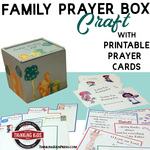
Get the Family Prayer Box Project FREE!
Teach your children to pray with this fun project that includes 7 printable sets!

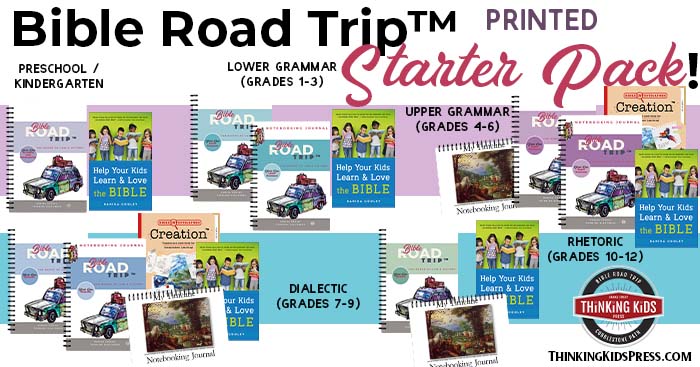


















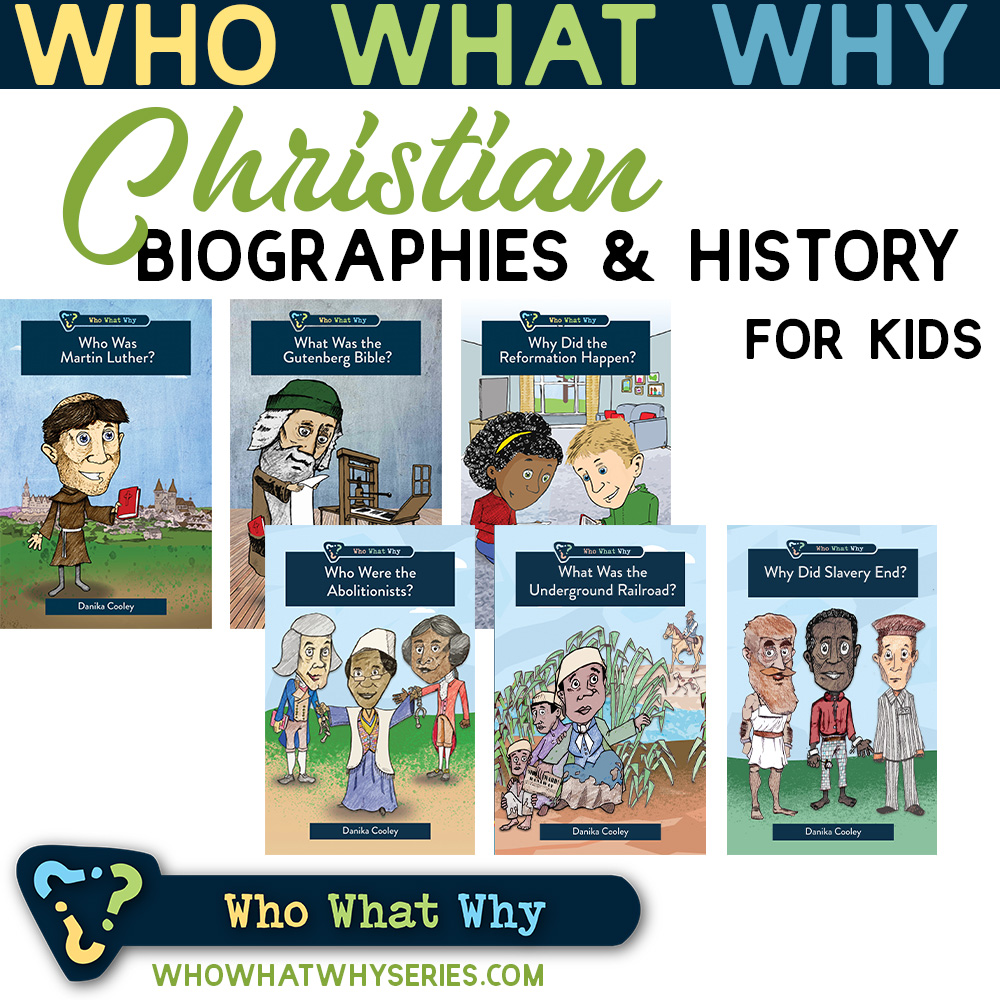








































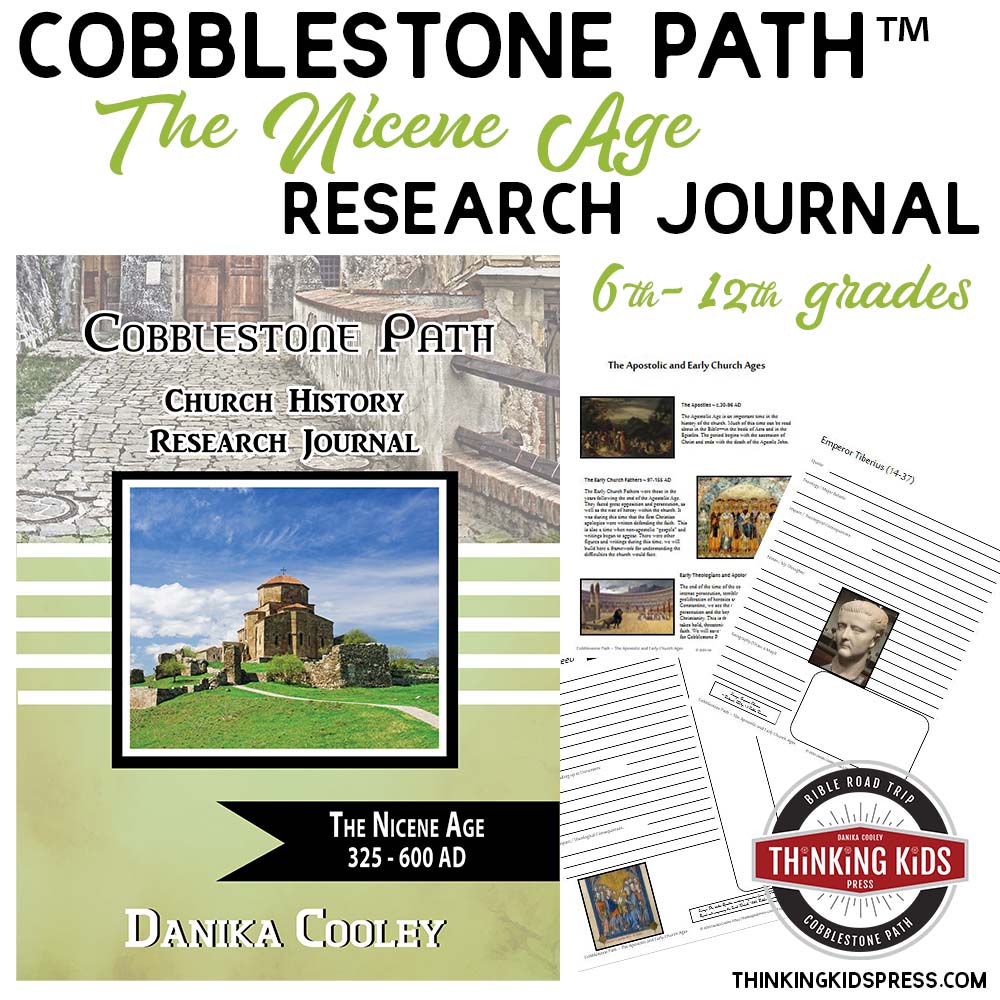






















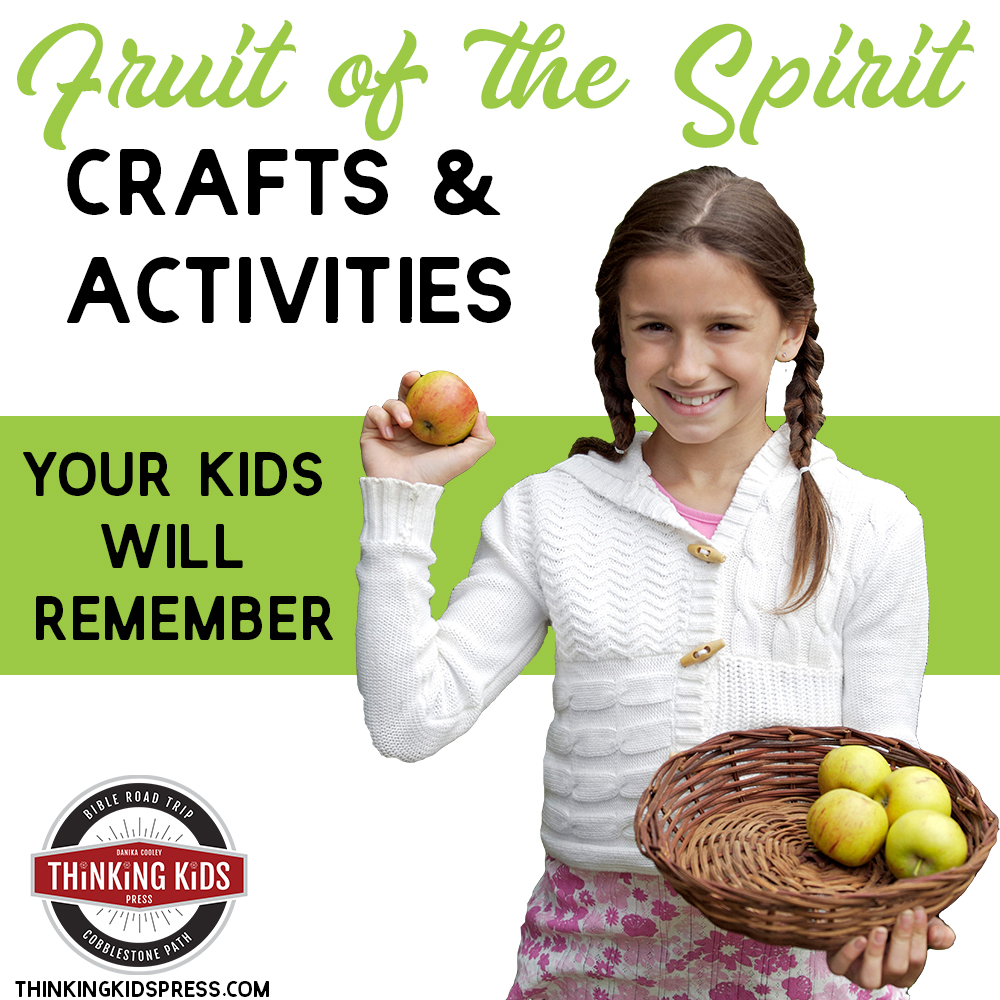


















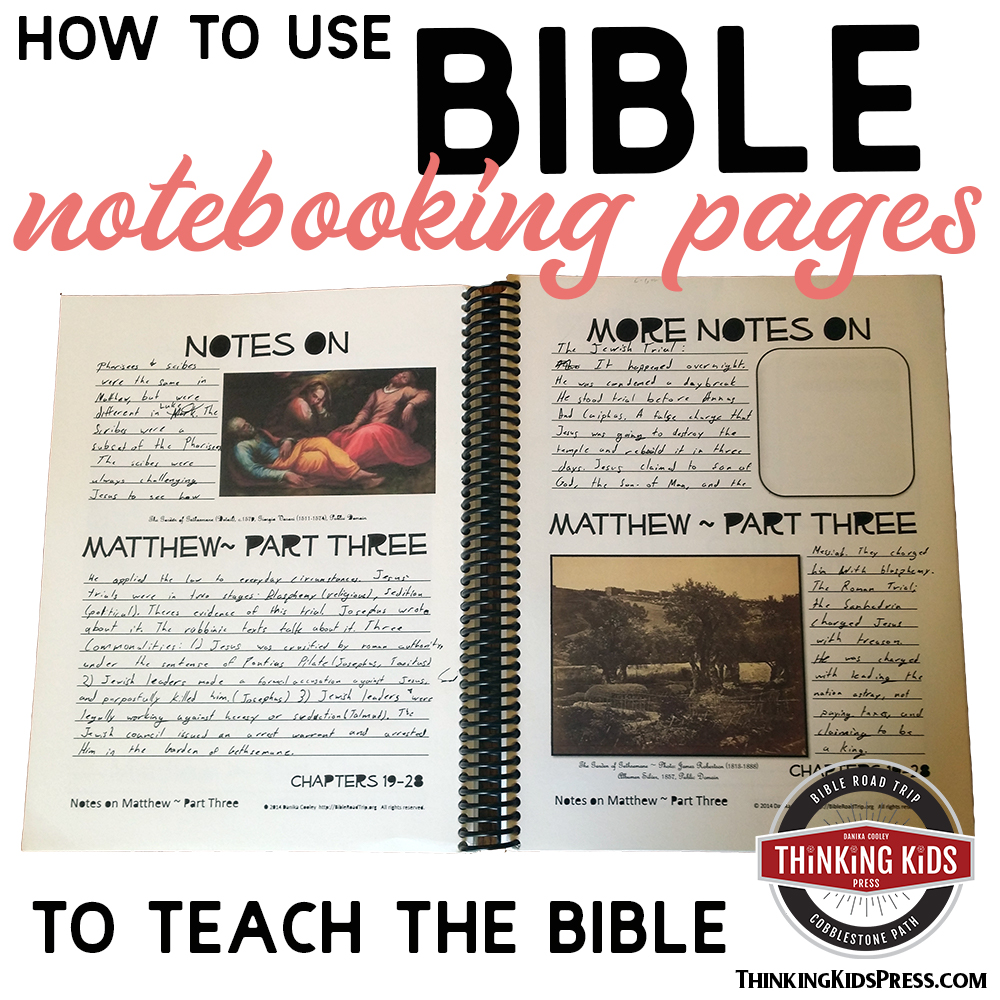





















































I enjoyed reading about this wonderful Bible curriculum that I’d love to use with my three children!
Just truly appreciate the materials and ideas you have available! I always leave your blog with encouragement on this homeschool journey!
I love that you have all grades covered in your Bible Road Trip curriculum.
Thank you for breaking down each level. Very helpful!
I love the Bible Road Trip that I purchased in the byb sale this year.
Thank you for providing a free sample! I am excited to look through it!
As I read through the post, one truth really hit me. If a child isn’t taught how to think, they won’t be able to grasp the deeper truths and doctrines of the Word of God when they hit highschool age. So, the question is, how do we make sure we are teaching our kids to think!
Good ideas. Each age has to be able to grasp what you teach at there own level and this will definitely help.
Thanks so much for this giveaway!
Great thoughts!
I’m always looking for more ways to teach the Bible to my kids.
I have been searching for a curriculum that would make it exciting for my children to love reading and learning about the word of God. And I knoe the Bible Road Trip is IT!! Finally, it will be fun and educational at the same time, I think that now they can see God themselves with the curriculum. Thank you for creating it.
I enjoyed reading about the different age levels. I have kids in elementary and middle school levels.
Love the stages and the use for multiple grade levels! Great for larger families or families with multiple children!
This Bible curriculum looks pretty interesting. Thanks!
I love that it breaks it down by grades.
Thank You so much for the chance at the giveaway!
I appreciate the careful thoughtfulness about developmental stages and how to structure learning the Word of God for each stage.
I hadn’t thought about how the educational developmental stages related to Bible learning but it makes sense. My kids are all in the preschool and lower grammar levels.
Clever organization
Thank you for spending the time to write all this out in detail, it was very helpful and enlightening. I’m excited to use the Bible toad trip this year
I’m very interested in a bible curriculum that gives me a lot of guidance and help with bible memorization. I feel pretty lost on how to start this in our every day routine so I’m looking into it! Thank you!
I like the bible memory cards. Thanks for hosting.
I didn’t know you had Memory cards that you could purchase. I also like that there are levels and it is easy to use for multiple age levels.
Thank you for the chance to win your giveaway!
Excited to take a deeper look at the bible curriculum! I’m always looking for fun ways we can learn as a family! ❤️
What I found to be interesting was using the Classical style of learning to learn the Bible. We use it with our homeschooling, but never thought to use it for teaching Bible
I love the structured and methodical way of incorporating scripture!
I love this! We are in deep in the Armor of God at ladies bible study. It’s so exciting to get to teach my kids about it!
This is an awesome blog!!!!
Love all ideas you have given on teaching the Bible to kids. Fun memorization ideas.
I love all your ideas! Thank you for sharing.
I would love to try the BIble Road trip.
Thank you for these ideas. I gained a lot of insight from reading your blog.
Thank you for this giveaway!
I loved reading all about the levels of bible study, and I opened up a bunch of other articles from your site that I can’t wait to read!
This Bible curriculum sounds like it would be a great fit for our family! Thank you!
This is an amazing opportunity for my family to win!! Thank you!!
We love your Field Trip Planner and Pastor Sermon notes!
I found this post about teaching the Bible to children very interesting
It was interesting to learn that there are many more homeschool mom groups than I realized!
I really enjoy reading your blog!
Thank you not just for your post, but also for hosting the giveaway! 2 good things in the same spot! 🙂
I’m so excited about the bible memory cards that you created to go with the bible road trip curriculum! Thanks for the giveaway opportunity
I think the Bible Road Trip Curriculum sounds so interesting.
I really appreciate information like this. I need help understanding the Old Testament better! And I need help differentiating a study of the Bible from devotions. Thanks!
Thank you for this great opportunity! I love Timberdoodle products!
We home school classically (CC), and we are in the early years of dialectic with our oldest. I love that we can approach the Bible that way too!
I enjoyed learning about the stages children go through as they develop and how the Bible curriculum can be used together as a family.
Love your blog and thanks for the giveaway!!
So excited for this! Thank you!